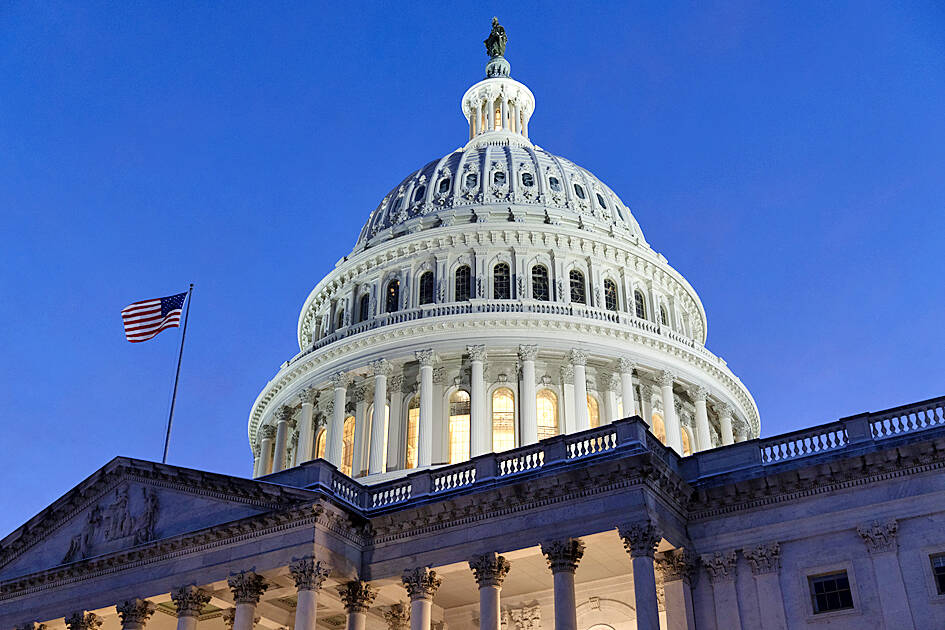The US House of Representatives on Wednesday passed a measure that would eliminate double taxation between Taiwan and the US as part of a larger taxation package.
The US-Taiwan Expedited Double-Tax Relief Act was included in a US$78 billion package of tax breaks for businesses and low-income families passed by a 357 to 70 vote.
The long-anticipated measure aims to eliminate double taxation of those who receive income in Taiwan and the US, including semiconductor manufacturers building factories in the US.

Photo: EPA-EFE
The Tax Relief for American Families and Workers Act of 2024 now heads to the US Senate, where Republicans have voiced resistance to some aspects of the larger bill.
However, the strong bipartisan support shown by the House vote might influence its passage in the Senate.
US Representative Ami Bera said in a statement that the legislation would reduce dependence on the People’s Republic of China for critical technologies and resources, and increase direct investment between Taiwan and the US.
It would not only increase Taiwan-US competitiveness, but also improve the ability of workers and businesses to withstand Beijing’s economic influence, and enhance the thriving relationship between Taipei and Washington, he said.
After the bill passed committee review last month, White House press secretary Karine Jean-Pierre said that its progress was encouraging and welcomed, and that the White House expected it to pass the US Congress and be signed into law by US President Joe Biden.
In Taipei, Executive Yuan spokesman Lin Tze-luen (林子倫) yesterday thanked US lawmakers for their support and said Taiwan is optimistic that the rest of the legislative process could be completed quickly.
There is a high degree of agreement between Taiwan and the US on the double-taxation issue, Lin told a news conference following a Cabinet meeting.

BUILDUP: US General Dan Caine said Chinese military maneuvers are not routine exercises, but instead are ‘rehearsals for a forced unification’ with Taiwan China poses an increasingly aggressive threat to the US and deterring Beijing is the Pentagon’s top regional priority amid its rapid military buildup and invasion drills near Taiwan, US Secretary of Defense Pete Hegseth said on Tuesday. “Our pacing threat is communist China,” Hegseth told the US House of Representatives Appropriations Subcommittee on Defense during an oversight hearing with US General Dan Caine, chairman of the Joint Chiefs of Staff. “Beijing is preparing for war in the Indo-Pacific as part of its broader strategy to dominate that region and then the world,” Hegseth said, adding that if it succeeds, it could derail

CHIP WAR: The new restrictions are expected to cut off China’s access to Taiwan’s technologies, materials and equipment essential to building AI semiconductors Taiwan has blacklisted Huawei Technologies Co (華為) and Semiconductor Manufacturing International Corp (SMIC, 中芯), dealing another major blow to the two companies spearheading China’s efforts to develop cutting-edge artificial intelligence (AI) chip technologies. The Ministry of Economic Affairs’ International Trade Administration has included Huawei, SMIC and several of their subsidiaries in an update of its so-called strategic high-tech commodities entity list, the latest version on its Web site showed on Saturday. It did not publicly announce the change. Other entities on the list include organizations such as the Taliban and al-Qaeda, as well as companies in China, Iran and elsewhere. Local companies need

CRITICISM: It is generally accepted that the Straits Forum is a CCP ‘united front’ platform, and anyone attending should maintain Taiwan’s dignity, the council said The Mainland Affairs Council (MAC) yesterday said it deeply regrets that former president Ma Ying-jeou (馬英九) echoed the Chinese Communist Party’s (CCP) “one China” principle and “united front” tactics by telling the Straits Forum that Taiwanese yearn for both sides of the Taiwan Strait to move toward “peace” and “integration.” The 17th annual Straits Forum yesterday opened in Xiamen, China, and while the Chinese Nationalist Party’s (KMT) local government heads were absent for the first time in 17 years, Ma attended the forum as “former KMT chairperson” and met with Chinese People’s Political Consultative Conference Chairman Wang Huning (王滬寧). Wang

CROSS-STRAIT: The MAC said it barred the Chinese officials from attending an event, because they failed to provide guarantees that Taiwan would be treated with respect The Mainland Affairs Council (MAC) on Friday night defended its decision to bar Chinese officials and tourism representatives from attending a tourism event in Taipei next month, citing the unsafe conditions for Taiwanese in China. The Taipei International Summer Travel Expo, organized by the Taiwan Tourism Exchange Association, is to run from July 18 to 21. China’s Taiwan Affairs Office spokeswoman Zhu Fenglian (朱鳳蓮) on Friday said that representatives from China’s travel industry were excluded from the expo. The Democratic Progressive Party government is obstructing cross-strait tourism exchange in a vain attempt to ignore the mainstream support for peaceful development